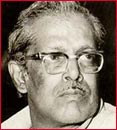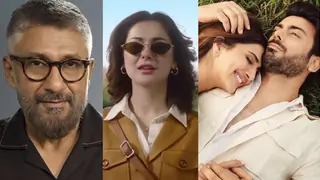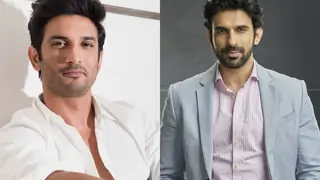Article published during his last movie 'Jhooth bole kaukaa kaate'
Hrishida's not back!
V S Srinivasan Hrishikesh Mukherjee. Click for bigger pic!
|
Any presumptions about him he rejects almost out of hand. Hrishikesh Mukherjee may be making his new film,
Jhoot Bole Kauva Kate after a long time but he firmly denies assertions that he's "back". Simply because he was never away. As quickly does he brush away claims that his
Jhoot Bole Kauva Kaate is a "different" film though his past performances would suggest otherwise. Hrishikesh Mukherjee has 41 films to his credit, starting with
Musafir, wherein Dilip Kumar warbled his one and only song -- a
thumri with Lata Mangeshkar --
Laagi nahi choote Rama. Among his memorable films are
Guddi, Abhimaan, Chupke Chupke, Bawarchi, Khubsoorat, Satyakam, Mili, Anari and
Bemisaal. Jhoot Bole Kauva Kaate, which he is directing for Polygram and Tri Star International, is a quieter movie. In an era where violence and sexy numbers rule, where can a sensitive Hrishikesh Mukherjee film find its place? "Who said my films are sensitive? I've never claimed that. I have burrowed deep into the different emotions of human beings, but I never stirred or dealt with their basic instinct. They (
the films) were simple and entertaining. However, my films managed to carve a niche for themselves even in the '70s which were marked by the arrival of the action genre.
With Juhi Chawla and Anil Kapoor. Click for bigger pic!
|
"I strongly believe that excess of everything creates less impact and that is what is leading people to look for fresher and newer things today." So when did he decide to come back? "
Beta, I had never left filmdom. I was always here making serials or something like that. But then I was down with arthritis. I had a knee operation and hence was out of action. There were times when I would come to my sets on a wheelchair and crawl along the ground to reach a spot. It was tiring and exhausting. I could not handle all that. So I decided to do less work. "Moreover I had never stopped work to make a comeback. In the 10 years of my absence, I was actively involved with making serials for DD. However, due to arthritis, both my knee caps had to be replaced, which accelerated my decision to retire and lead a contented life." Till a friend from Polygram, Shashi Patel, asked him if he could direct a film for Polygram. This was around the time Polygram's first venture,
Khamoshi, was just completed. "I narrated a storyline to Shashi Patel, which he liked. The story idea is written by famous Bengali writer Bimal Kar." The same idea was gestating when Hrishikesh Mukherjee made films like
Golmaal and
Naram Garam in the 1980s with Amol Palekar and Utpal Dutt." He was thinking of making a third film to complete a comic trilogy.
Juhi Chawla, Sajid Khan and Anupam Kher in Jhoot Bole Kauva Kaate. Click for bigger pic!
|
Hrishida had to find a cast that could do the job that Amol Palekar and Utpal Dutt were to play ten years ago. He cast Anil Kapoor, Juhi Chawla and Amrish Puri in the key roles in the romantic comedy. Kapoor and Chawla are university students in love with each other. The girl's father, disapproves of the closeness, asserting there was a time and place for everything. Though the story is essentially about how they convince the father, it is the treatment of such a simple story that is more interesting. Juhi begins telling you the story: "See, There is this guy whom I love... Even he's in love with me. But then I cannot marry him since I cannot go against my father who will never agree. That means that I have to leave him." The director pitches in. "Amrish is a typical Maharashtrian man and so Anil changes his name, hairstyle and dress to suit his tastes and tries to win him over. But Amrish is a hard nut to crack as Anil realises, and he soon tells Juhi he can't convince her father. So Juhi tells him that they have to part ways. However, all ends happily." So where does the crow fit in? "Ah yes, the crow. It is the hero of the film. Whenever Anil Kapoor lies to Amrish Puri, a crow is heard cawing. Amrish believes that if a crow caws, someone is lying. Coincidentally, every time Anil lies, the crow caws," Hrishda laughs.
 |
Amrish Puri and Anil Kapoor in Jhoot Bole Kauva Kaate. Click for bigger pic!
|
"I am quite satisfied with the way the film has shaped up. Juhi is terrific in the film. Anil and Amrish too have come up with great performances. There's also Anupam Kher in the film, apart from choreographer Farah Khan's younger brother Sajid Khan -- the popular television host -- who makes his film debut. Hrishida's films have been associated with irony... Is that present in
JBKK? "I have made films on the experiences I have been through. Laughter, tears, brooding are part of life and I want to share all this with the viewers.
Jhoot Bole Kauva Kaate stands up to this in every respect. There are only five characters and their characterisation stands out." The director is also happy the stars have slashed their prices to work with him. "It feels good. They might have been fed up of the same violent and action doses. They need variations and thought they could gain new insight... They know film-makers like us don't cash in on their images. I remember the day when Amitabh Bachchan came up and asked me to make a film with Jaya Bhaduri and him, reducing his price to one-eighth of his market price. That is how I made
Abhimaan on their lives." However Manisha Koirala, who had also expressed a desire to work with him, had not reduced her price. And there were date problems too.
Click for bigger pic!
|
How did Hrishida deal with stars like Anil Kapoor, Juhi Chawla and Amrish Puri? "I had no problems. None at all. Couple of times Anil came late on the sets and I asked him to come on time, since otherwise the situation would go out of my control. It would become very difficult to complete this film in time and the cost of production would go up. Once he came to the sets in shorts and I gave him the firing of his life. He became fine later. "I wanted to shoot the first shot with Amrish because the film starts and ends with him. Amrish came back all the way from Scotland, where he was shooting for another project, and was on the sets two hours later to start work." And why hasn't he made movies more in tune with popular demand? "I have been in this industry for more than 50 years and given 10 silver jubilees. My films have won many national and international awards. But I've never ever given in to box office demands. I work on subjects which strongly interest me. I will never bow to any demand. But of course, I will still reach the people through my films."







 There is a certain poignance, as you look at him, that grabs you by the neck, leaving a lumpy heaviness that no amount of clearing your throat can ease. "My son died unexpectedly, suddenly, on June 6... The award (Dadasaheb Phalke Award) means little to me except that the announcement reminded people of me. And they came to visit me or called me... That is very pleasant -- to revive old associations." One of the old associations, of course, being co-Phalke award-winner Dadamoni (Ashok Kumar),
There is a certain poignance, as you look at him, that grabs you by the neck, leaving a lumpy heaviness that no amount of clearing your throat can ease. "My son died unexpectedly, suddenly, on June 6... The award (Dadasaheb Phalke Award) means little to me except that the announcement reminded people of me. And they came to visit me or called me... That is very pleasant -- to revive old associations." One of the old associations, of course, being co-Phalke award-winner Dadamoni (Ashok Kumar),  THESE days, Hrishida spends his time reading, watching a bit of television, particularly Kaun Banega Crorepati which he says Amitabh is doing a fabulous job of. He hates reviving old memories, never collects photographs but shows you one newspaper cutting which he's kept because his pet dog is in the picture with him! And the director he sits, looking over the Arabian Sea from his Bandra home in Bombay. And you, you are left with the uncomfortable lump in your throat. The point is not whether the Dadasaheb Phalke Award for his contribution to Indian cinema has come too late. The point is he has won it. What ebbs are the tides of the Arabian Sea.
THESE days, Hrishida spends his time reading, watching a bit of television, particularly Kaun Banega Crorepati which he says Amitabh is doing a fabulous job of. He hates reviving old memories, never collects photographs but shows you one newspaper cutting which he's kept because his pet dog is in the picture with him! And the director he sits, looking over the Arabian Sea from his Bandra home in Bombay. And you, you are left with the uncomfortable lump in your throat. The point is not whether the Dadasaheb Phalke Award for his contribution to Indian cinema has come too late. The point is he has won it. What ebbs are the tides of the Arabian Sea. 






















